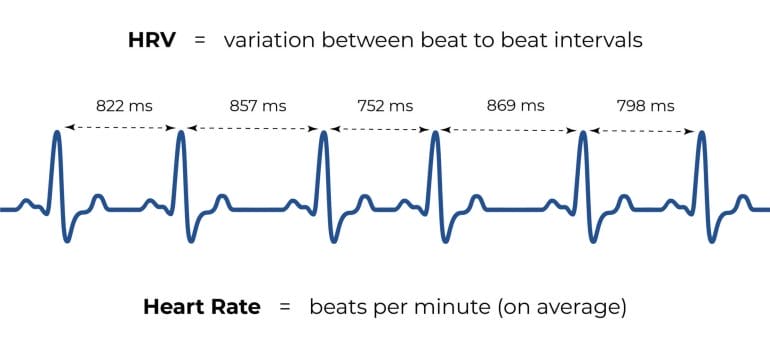
A Sign of Good Health You Don't Know About
This week, we are talking about matters of the heart.
So in love, you should…
Just kidding. I know nothing about that.
Before reading on, please give your answer to the following and no cheating
PS: If there’s nothing there, just wait a few seconds until the page loads
So what did you choose?
We all know that a heart rate that is too slow, too fast or irregular can be a sign of heart disease so you can’t be blamed for choosing the first answer which is wrong.
And if you chose the second, more baffling answer, it’s either you know your medical physiology or you cheated somehow. I believe more of the latter.
Heart Rate Variability
Heart Rate Variability (HRV) is a measurement of the variation in time between successive heart beats. Simple as that.
A high HRV, meaning the more the variation between your heartbeats has been shown to be a signal of a healthy heart. This means that instead of your heart beating at a constant rhythm of “lub dub, lub dub, lub dub, lub dub, lub dub”, you actually want your heart to do more of the following:
“Lub dub (pauses for a sip of tea), lub dub, lub dub, (sprints to the next beat), lub dub”.
It’s important to note that the variability is of fractional duration at a time. There are arrhythmias which are medical conditions in which your heart rate variability is all over the place and that’s not what I am talking about.
HRV though, is actually a reflection of your autonomic nervous system than your heart. The autonomic nervous system is the autopilot nervous system in your body that controls a lot of vital activities you don’t control, such as breathing rate, digestion, blood pressure and of course, heart rate.

So why is this relevant?
High HRV
Let’s start with a high HRV. A high HRV, according to several studies, signals a healthy heart because it reflects the heart’s ability to respond quickly to rapid changes in the body. Things that can cause it to change are environmental stimuli, emotions, mental health, stress and metabolic imbalances in the body.
I will extract a piece from an article from the Harvard Health blog that says it all well.
In a healthy person, HRV should increase when your heart rate drops, as it does during relaxing activities such as reading or meditating. HRV decreases as the heart rate rises, such as when you exercise or are under stress. In fact, it changes constantly, both throughout the day and from day to day.
A low HRV
It then follows that a low Heart Rate Variability is a sign of ill-health.
People with low HRV have an increased risk of Cardiovascular Disease and are less able to cope with stress. Studies have simply shown a correlation between ill-health outcomes and a low Heart Rate Variablity. Explanations as to why are still unclear.
How to track HRV
Unlike blood glucose levels that have a universal level that is considered good or bad, there is no one good value of what your HRV should be. It’s highly variable between people due to fitness levels, gender, diet etc.
What’s important to track is the trend of your HRV. If you wear a smartwatch, it probably can measure your HRV and make a trend of whether your HRV is increasing or decreasing depending on your baseline.
As such, it means that if someone has a higher HRV than you, it doesn’t mean they are fitter or healthier. But if you increase you HRV against a baseline that you set yourself, you know you are on the right path.
How to increase Heart Rate Variability
That’s what we all want to know now, isn’t it?
Well, because HRV is such an automatic process in the body, it’s not something we can directly influence or control. Studies do show however, that people who do the following have higher levels of HRV.
- Exercise regularly, especially athletes
- Having a healthy diet while staying hydrated
- Manage mental stress levels through various techniques such as sleeping on time, journalling etc
Conclusion
The take away from this article is this:
The greater your degree of physical fitness and health, the more variable the heart rate is.
A bonus marker of health in addition to HRV, is VO2 max level. This will be for another article but now you know that a constant, regular heartbeat might be a sign that you are not fit or healthy.
Your next article...
